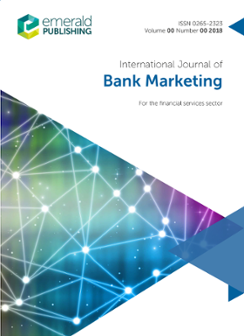计划行为理论对零售银行客户在不同关键切换事件下切换倾向的影响
IF 6.3
3区 管理学
Q1 BUSINESS
引用次数: 0
摘要
本文旨在探讨计划行为理论(TPB)提出的行为前因(即积极的主观规范、高度感知的行为控制和对转换的积极态度)对零售银行客户在几个关键转换事件(即对其当前银行的不利声誉事件或对竞争对手银行的有利声誉事件、服务失败、服务失败和服务失败)中的转换倾向的影响。收费和利率问题、羊群行为、不便、替代银行的吸引力和不道德的银行行为)。设计/方法/方法在324名塞浦路斯零售银行客户中进行了一项自行完成的在线调查。对于数据分析,研究人员使用了主成分分析(PCA)、验证性因子分析(CFA)和结构方程模型(SEM)。研究发现,TPB指定的行为前因在不同的csi中起着不同的作用。积极的主观规范可能会促使银行客户在服务失败、银行声誉不利、替代银行的吸引力、不便、其他银行的良好声誉和羊群行为等关键事件下进行切换。只有在其他银行声誉良好的情况下,高度感知的行为控制才能导致转换。最后,对于转换的积极态度可能会影响银行客户在服务失败、银行声誉不利、替代吸引力和不便的情况下进行转换。原创性/价值据作者所知,之前没有其他研究工作考察了不同csi下切换行为的前因(由TPB指定)与切换倾向之间的相互作用。在类似事件中,一些银行客户选择转到其他银行,而另一些客户选择不转到其他银行,这项研究解决了解释原因的差距。本文章由计算机程序翻译,如有差异,请以英文原文为准。
The effects of the theory of planned behaviour on the switching propensity of retail banking customers at different critical switching incidents
Purpose The paper aims to explore the effects of the behavioural antecedents suggested by the theory of planned behaviour (TPB) (i.e. positive subjective norms, high perceived behavioural control and positive attitudes towards switching) on the switching propensity of retail banking customers at several critical switching incidents (CSIs) (i.e. events of unfavourable reputation concerning their current bank or favourable reputation concerning competitor banks, service failures, problems with charges and interest rates, herding behaviour, inconvenience, alternative banks' attractiveness and unethical bank practices). Design/methodology/approach A self-completed online survey was conducted among 324 Cypriot retail banking customers. For the data analysis, the researchers used principal component analysis (PCA), confirmatory factor analysis (CFA) and structural equation modelling (SEM). Findings The study revealed that the behavioural antecedents specified by TPB play different roles in various CSIs. Positive subjective norms may drive bank customers to switch at critical incidents such as: service failure, unfavourable bank reputation, alternative banks' attractiveness, inconvenience, favourable reputation of other banks and herding behaviour. High perceived behavioural control can lead to switching, only in the case of other banks' favourable reputation. Finally, positive attitudes towards switching may affect bank clients to switch in cases of service failure, unfavourable bank reputation, alternative attractiveness and inconvenience. Originality/value To the best of the authors' knowledge, no other previous research work has examined the interaction between the antecedents of switching behaviour (as specified by TPB) and switching propensity at different CSIs. The study addresses the gap of explaining the reasons for which, at similar incidents, some bank customers choose to switch to other banks, whereas others do not.
求助全文
通过发布文献求助,成功后即可免费获取论文全文。
去求助
来源期刊

International Journal of Bank Marketing
BUSINESS-
CiteScore
10.70
自引率
18.90%
发文量
54
期刊介绍:
International Journal of Bank Marketing (IJBM) aims to publish papers that relate to the marketing challenges of financial services providers around the globe.
Preference is given to empirically-based research papers that expand on existing theories (or develop new ones) on customer behaviour in financial services settings.
In addition, the journal is interested in helping academicians and practitioners in the field to better understand the discipline of financial services marketing, and as a result review papers and thought pieces are invited for submission.
 求助内容:
求助内容: 应助结果提醒方式:
应助结果提醒方式:


